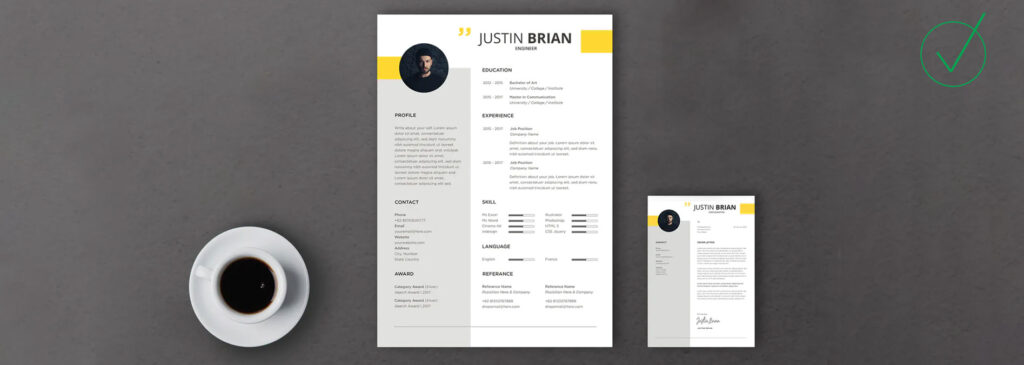If you are just out of college and are looking for an engineering position, it can be challenging to know what to put in your resume. This blog will tell you what to put in your resume for your first engineering job and provide some tips on making your resume uniquely you.
You’ve done so much work to get to this point!
Let’s show it in the best light!
Step 1. Read the job description for keywords
Most of us know at this point that resumes may be run through an algorithm (ATS) before they reach the recruiter – and that algorithm is looking for the job description’s keywords. That is why you must tailor each resume to each job you submit on. The time taken to parallel the language of the description in your resume will increase your chance of getting the interview.
You’re an engineer, so put your high attention to detail to work.

Step 2. Design a clear and efficient format
The first person to look at your resume could be looking through a hundred resumes for one job position – which is why you may see that your resume only has “seven seconds” to be viewed.
Therefore, your engineering resume needs to be clean, clear, and easy to scan, not read.
- Make your format draw attention to your work experience.
- Arrange your experience in reverse chronological order—or the most recent, relevant experience first.
- Use bullets, not paragraphs, to describe your work.
- Energize your resume with active voice, not passive voice, and use power verbs like “managed”, “collaborated”, or “organized”.
- Remember color is a chic decoration, not a tacky distraction.
- Keep consistent structures throughout your resume.
- Change any standard templates from Word, Pages, etc. to be unique to you.
- Ensure your contact information (email and phone) are easy to find. If you have a LinkedIn account—and you really should have one—add a link to it with your contact info.

Step 3. Summarize your education
If you are just graduating from college, your education may be your most recent, relevant professional experience. It should be at the top. You should list:
- The institution you are graduating from.
- Your degree, major, minor, double minors, etc.
- When you will graduate (year and month will do).
- Your G.P.A. – Some engineering job positions have strict limits on G.P.A. (like having to have one higher than a certain amount). A general rule of thumb is that if your G.P.A. is higher than 3.25, include it.
Make your education sound like it was a job with a narrative…
You didn’t just pursue a major in Civil Engineering; you experimented with multiple fields and decided engineering was your calling.
You engaged in specific courses that gave you viable, quantifiable world experience.
You spent months training on valuable software like Civil3D, AUTOCAD, or REVIT to deliver projects.

Step 4. Make your experience the star of the show
When pursuing an engineering position, your professional and relevant experience is always going to carry more weight than your education.
What should I list here?
- Previous job positions
- Internships
- Volunteer experience (just because you weren’t paid doesn’t mean it’s not related!)
How do I organize the information?
- Maintain a consistent format for how you present your company, title, and responsibilities for easy scanning.
- Highlight your engineering experience, including internships, co-ops, and volunteer work.
- Remember those active words and bullets!
- Place relevant experience near the top to catch the reader’s eye, even if it is not the most recent—just don’t fudge dates.
- Draw attention to how your “irrelevant” jobs gave you relevant experience—look for the “soft skills” in the job posting, like communication skills, organization skills, deadline management, etc.
- Quantify your experience with specific numbers and percentages—How many people did you work with or manage? By what percent did you increase productivity? What was the length of your average deadline?
Write past deeds in past tense and present deeds in the present tense.
If you have space, include your “outside” interests to round out your personality.
Don’t be afraid to show your experience that isn’t strictly professional or just your education. Think of including:
- Your relevant skills with a “measurement” of how proficient you are in that skill.
- Your volunteering experience, even if it isn’t engineering-related, because it shows you’re well-rounded and civic-minded.
- Your club and society participation, especially if you had a leadership role.
- Your interests outside of work—hobbies and non-professional (but still appropriate!) activities personalize you.
Step 5. Review, spell-check, and submit!
Your resume shows how you can follow instructions and do impeccable work. If you have typos in a resume, the reader will not think you are qualified to handle harder work. It’s that simple.
Have someone else read your resume and provide a review. Your eyes will stop seeing mistakes after a while, and you’ll get feedback on how a stranger would read your resume.
Unless the job description asks for a word document, then PDF your resume so it won’t get “jumbled” by the reader’s computer and submit!

Looking for some additional resources for writing your first post-grad resume? Check out some of the resources below:
